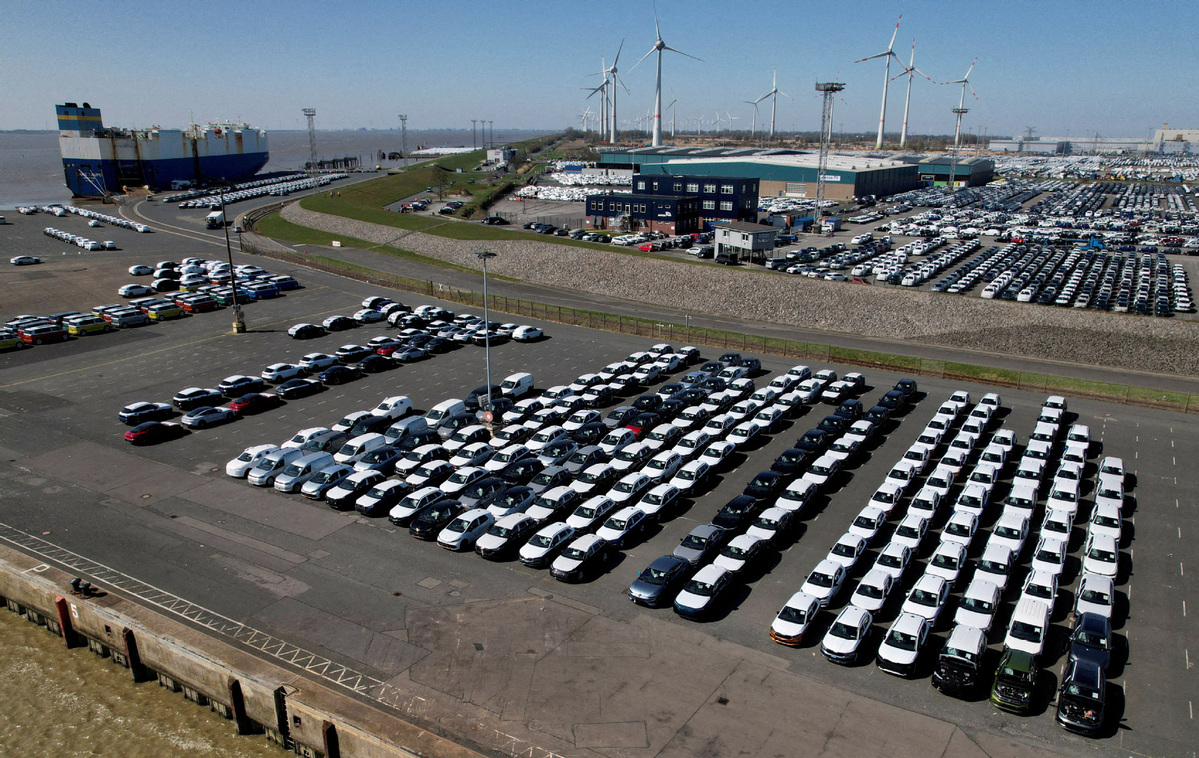Jul 29, 2025, 13:31

Drone view shows Volkswagen Group cars bound for cargo ship export to the United States at the seaport of Emden near the estuary, where the River Ems flows into the North Sea, in Emden, Germany, April 2, 2025. [Photo/Agencies]
Global Times-While the US-EU trade agreement may have averted an immediate transatlantic trade war, European automakers remain under significant pressure as tariff costs continue to undermine their competitiveness.
Germany's top three carmakers are set to have more than 10 billion euros ($11.7 billion) wiped off their cash flows this year as US tariff costs add pressure to the industry, the Financial Times reported on Sunday.
Specifically, cash flows are likely to fall from 9.4 billion euros last year to 3 billion euros at Mercedes-Benz, from 7.1 billion euros to 3.3 billion euros at Volkswagen, and 4.8 billion euros to 4.4 billion euros for BMW, according to data from Visible Alpha.
These figures reveal the severe challenges facing European automakers, as the car industry has been one of the hardest hit by US tariffs.
The US and the EU have reached a trade agreement, under which EU goods exported to the US will be subject to a 15 percent tariff, according to Reuters. This has received mixed reactions in the EU, with official and industry figures warning that tariff levels remain elevated.
Finnish Minister for Foreign Trade and Development Ville Tavio said on Sunday (local time) that while the agreement has calmed the situation, there is absolutely no reason for celebration, as tariff levels remain high, according to media reports. This underscores a harsh reality: even with the new 15 percent tariff rate, Europe's automakers remain at a severe competitive disadvantage in the US market.
What is even more worrying is that the damage goes beyond these immediate financial losses. The ripple effects of US tariffs will extend across supply chains, disrupting production and raising costs industry-wide. Such trade barriers may also trigger a broader chain reaction of protectionism. In order to protect domestic industries, the EU may impose similar trade obstacles on automobiles and parts from other regions, further fragmenting the global automotive supply chain. Such a scenario would only deepen the crisis for European carmakers, already struggling with fierce competition in the transition to electric vehicles (EVs).
Against this backdrop, Europe's auto sector stands at a critical juncture of adjustment. As access barriers to the US market are constantly rising, how to diversify beyond the US market is the fundamental challenge facing the EU. Thus, the vast potential of China, the world's largest automotive market, offers a crucial opportunity. For European automakers facing the challenges of tariffs and protectionism, enhancing cooperation with China is not only a way to offset current tariff pressures but also a strategic move to position themselves for future industrial competition.
China is the world's largest automobile consumer market and a crucial source of innovation in new-energy vehicle technologies. In the first half of 2025, China retained its position as the fastest-growing major EV market with sales in the region up 32 percent year-on-year. Europe's EV market grew 26 percent year-on-year and North America's just 3 percent, according to Rho Motion's EV & Battery Database.
If European automakers can seize the opportunities in the Chinese market, they can offset pressure in the US market and also maintain competitiveness in key areas of the future automotive industry such as electrification and digitalization.
As the global car industry chain undergoes tremendous changes, the strategic value of the Chinese market has become increasingly prominent. Yet, whether this potential can be fully unleashed and translated into opportunities for European automakers largely depends on whether they can find a mutually beneficial cooperation model. This includes not only expanding sales in China but also deepening cooperation with Chinese companies in areas such as technological research and development (R&D) and manufacturing.
Some forward-thinking European automakers have already begun to do so. For instance, in March, Volkswagen and Chinese automaker FAW Group signed an agreement to launch 11 new Volkswagen- and Jetta-branded models tailored for the Chinese market from 2026. BMW announced a partnership with Huawei to develop an in-car digital ecosystem in China based on the technology company's Harmony operating system. These agreements have helped European automakers reduce R&D costs and enabled them to quickly respond to global market demands.
Europe's automotive future hinges on its ability to navigate the protectionism challenge, and the choice is clear: cooperation, not isolation, is the key to ensure European automakers' competitive edge.
Community login






Add a comment